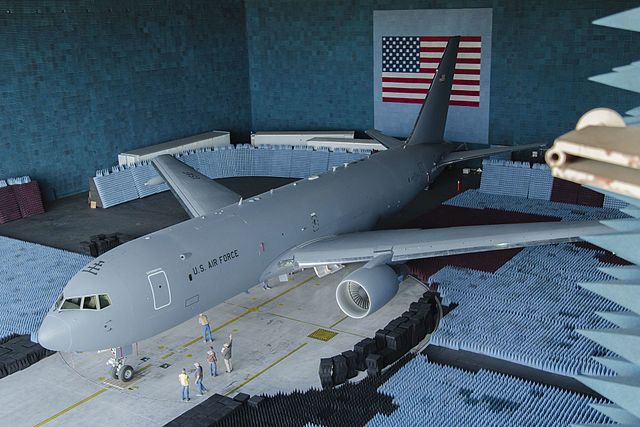Israel Agrees to Buy New KC-46 Tankers (More F-35s Coming Soon?)
By SETH J. FRANTZMAN
By U.S. Air Force photo by Christopher Okula – http://www.edwards.af.mil/News/Article/1197242/kc-46-pegasus-undergoes-testing-in-benefield-anechoic-facility/, Public Domain, https://commons.wikimedia.org/w/index.php?curid=59530675
Israel has needed new refuelers for its air force for years. Its aging fleet of converted Boeing 707s are sixty years old. Yet these expensive upgrades were put off, along with more F-35 purchases and helicopters, because of a budget battle between the Ministry of Defense and Finance Ministry. There were also questions about how to pay for the warplanes amid U.S. military aid to Israel and a decade-long memorandum of understanding with the US. Israel’s goal is to maintain its “Qualitative Military Edge” over opponents in the region for decades to come. The tankers will join more F-35s, helicopters, air defense systems and other advanced technology.
Now it is official. Israel will procure two tanker jets. The U.S. State Department had approved a sale of up to eight of the advanced aircraft in March 2020. The Israeli Ministry of Defense said a Letter of Offer and Acceptance had been signed. “In addition to the Tankers, similar processes will be launched to acquire a third F-35 squadron, heavy lift Helicopters to replace the CH53 Yasur fleet, advanced munitions and more. The procurement programs are conducted with U.S. Military channels, utilizing Foreign Military Financing (FMF),” Israel says.
“I welcome the progress in the procurement plan, which is critical at this point in time. It is a cornerstone of the IDF’s security concept,” said Israeli Defense Minister Benny Gantz. “I would like to thank our great friend the United States, for supporting the State of Israel on all levels. We will continue to work to complete the agreements that will enable the IDF to fulfill its purpose and to move forward with the missions facing us in the various arenas, near and far, at sea, in the air, on land and in cyberspace.”
The deal has been in the works for years and in recent weeks there was immense pressure to finalize it and move forward. This is reportedly because of U.S. pressure regarding timing and the production line and because Israel needs these aircraft. There has been talk of “frontloading” the financing. The group JINSA in the United States had recommended this in a report on February 7. Furthermore, there are elections coming up in Israel and the country has been dealing with budget battles for a year due to the seemingly endless elections the country has faced in the last two years. There is also the coronavirus pandemic. Israeli defense companies were at IDEX in Abu Dhabi, a huge defense exhibition this week, but many Israeli members of the companies couldn’t attend because Israel’s airports are closed due to the pandemic. Amid all this, and with Defense Minister Gantz likely out of a job after the elections, the deal was moved forward.
Over the weekend the head of the Israel Ministry of Defense Mission to the United States, Brig. Gen. (Res.), Mishel Ben Baruch signed a Letter of Offer and Acceptance, Israel said. The two KC-46 tankers will be manufactured by the Boeing Corporation. “In the next phase, two additional tanker aircraft will be acquired, out of a total of up to eight that will make up the future fleet,” Israel’s Ministry of Defense says. “As part of the agreement, the aircraft will be fitted with unique Israeli systems in accordance with the operational requirements of the Israeli Air Force (IAF). The first aircraft delivery is expected by the middle of this decade.”
That means that these aircraft won’t be flying in Israel for years. Yet Israel is facing tensions with Iran and pro-Iranian proxies such as Hezbollah. In addition, other Iranian proxies in Iraq, Syria and Yemen may threaten Israel. Israel also has new relations with partners in the Gulf and is moving forward with kitting out a new advanced warship to guard its exclusive economic zone. On Monday, February 22, Israel’s navy revealed it had recently confronted a threat from the Gaza Strip. This shows how important the tankers are.
On February 18 Israel’s General Staff of the IDF convened a workshop to discuss the multi-year plan dubbed Momentum Israel’s army is going through to prepare for future conflicts. “The workshop, which was held at the Dayan Base in Glilot, presented the implementation progress of the decisions of the multi-year program so far, including increasing the readiness to respond in the first and third circles, improving offensive capabilities, strengthening multi-force cooperation, responding to increasing threats in all theaters, the digital revolution, and preserving the IDF’s intelligence might,” the IDF said. During the workshop, the commanding officers of the Forces and Commands reviewed the progress of the multi-year plan’s implementation, in the light of the operational concept of victory, emphasizing military dominance in current and future combat theaters, Israel noted.
As part of Momentum Israel seeks to utilize advanced aircraft like the F-35 and pair them with the best intelligence, and air defense and other assets. Israel is constantly rolling out new technologies, such as electro-optics for drones, automatic target recognition and “deep learning” artificial intelligence applications for military units. Altogether the big picture is that the KC-46s and other new technology will blend well with Israel’s preparations for this future war. The Defense Ministry says that the new procurement will be crucial to strengthening the Israeli air force and maintaining Israel’s Qualitative Military Edge for decades. This means Israel will push for more F-35s, new helicopters and other “advanced munitions, air defense systems, marine and ground platforms, cyber systems and more.”
Originally published in The National Interest

